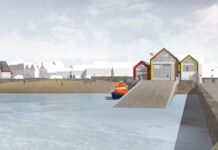
In an exclusive interview with Project Scotland, Hardies, the property and construction consultants, outline their succession planning strategy.
HARDIES, one of the Scotland’s longest running and largest multi discipline surveying firms with over 100 members of staff throughout its 14 offices, has embarked on a new era by appointing eleven new partners.
The firm currently has seven partners but with three of them set to retire in the near future, Hardies is preparing for that future and following a lengthy and detailed internal selection process identified a number of ‘rising stars’ within the company.
Eleven of them became Partners on 1 April 2015. They are Paul Duncan, (Valuation), Danny McArthur and Martin McConnell, (Building Surveying) in the Dunfermline office; Allan Smith (Quantity Surveying), Kate Bilbrough (Building Surveying), David Vince (Building Surveying) and Murray Warner (Project Management) in the Edinburgh office; Gary Ovenstone (Partner in the St Andrews office); Neil Moir (Valuation) in Hardies Aberdeen office; Keith Gifford in Hardies Dalkeith office and Darron McKay, Quantity Surveying, from the Dundee office.
Managing Partner Derek Ferrier explained, “We’re putting trust in our staff. Hardies has been providing surveying services for more than 100 years and the purpose of this succession planning is to make sure it goes on for another 100 years.
“We’re only custodians of the Hardies name. We identified the need to appoint eleven new partners to manage and develop our expanding business. These new partners have been identified as our rising stars. We advertised internally and it didn’t matter if someone had been here for five minutes or 30 years – it was about picking the right people for the right positions and anyone could apply.
“Technology is moving so fast and we need to release our young stars and see what they can do. We want to be at the forefront of our profession and this is how we will continue to achieve that.”
With offices across Scotland, Hardies offers a range of professional property and construction consultancy services from project management, quantity surveying and building surveying to valuation surveying and dispute resolution support services.
As Derek put it, “We do everything from Mrs Smith’s extension to Donald Trump’s golf developments.”
That hasn’t always been the case though, as Jim McArthur, Business Development Partner, explained. “The firm was started in 1913 in Dunfermline as a quantity surveying practice by John Gordon Hardie, who worked for one of the local authorities in the area before deciding to branch out on his own.
“It wasn’t the best time to start up, just before the First World War, but the firm managed to keep going. Core work came from the dockyard at Rosyth. After the war effort, the navy was built up and there was a lot of housing developed in the area. The firm developed a General Practice division and started doing residential valuations. In 1938, they decided to try their chances in Edinburgh when John’s son Gordon started up an office there. Then another World War broke out. There is a rumour Hardies started these wars to get a break from work!
“In 1946 the firm was back on song and in 1968 opened an office in Perth, followed by one in St Andrews in 1978.
In the late 1980s and early 1990s we reviewed our position in the marketplace and decided rather than compete with the big firms of residential valuation surveyors and quantity surveyors we had to find our own niche.
“At which point we decided to develop a full portfolio of property and construction related consultancy services, a ‘one stop shop approach’. We embarked on a major expansion, adding services such as project management and building surveying to complete the range of services required from inception to completion.”
Hardies now provides the full range of property and construction-related consultancy services. Their latest offering is dispute resolution support services – assisting clients in resolving issues without adopting formal dispute resolution procedures in a bid to avoid costly litigation.
Jim added, “Over the years we’ve built up a lot of experience and knowledge in various areas and we were looking to see where we could go next in terms of expansion.
“Although we always provided dispute resolution with people asking us to provide expert witness reports and attend court, we’d never focused on it before.
“We have teamed up with Len Bunton, who has been an adjudicator for a number of years and he has been taken on as a consultant to head up the new and improved service. Litigation is very expensive and time consuming. If a claim is less than £50,000 it’s hardly worth your while.
“We feel there’s a market for somebody to sit with both sides and persuade, encourage and coax to find a solution.
“The biggest problem we find is people get entrenched in disputes, a mountain of paperwork builds up on both sides and nobody wins. We now have enough skills in the various offices to be able to look at most property and construction problems that arise and give an independent view.”
Hardies has been involved in a wide range of high-profile projects over the years including the renovation at Stirling Castle, Donald Trump’s golf resorts in Aberdeen and Turnberry, the refurbishment of Coatbridge College and the stylish Tigerlily bar and restaurant in Edinburgh.
Jim admits the recession impacted the firm “hugely” but things are looking good again, with 2013/14 their best year for six years.
He added, “Property went over the cliff very quickly. In July 2007 everything went haywire. From the phone ringing every 30 seconds it just stopped.
“The great challenge in any recession is to leave yourself in the right shape for when you come out of it. It’s about cutting costs quickly but doing it in a way that is going to allow you to provide a platform for building the business back up once recession is over.
“Property valuation services in particular and immediately became a real problem for us due to the huge drop in demand.
“But on the construction side of things, we were involved in more long-term projects, which carried on and helped to shelter us a bit from the worst effects of the recession.
“In some cases, our clients had a budget for two or three years so we were able to subsidise the property side a wee bit from the construction side.
“That gave us a bit of time to decide how we were going to adjust the business.
“2013/14 was our best year for five or six years and 2014/15 is looking better again. We’re now going in the right direction and workload is stable and consistent
“The biggest problem is now becoming finding skilled staff. I was on a group of contractors, architects and surveyors who lobbied the Government in the early days of the recession to encourage them to put money into the industry by building houses for which there was a demand and to keep the industry going.
“We recognised the need to keep the skills in the industry. As soon as you start losing those skills, it’s difficult to get them back again.
“People who worked in construction left and became used to working indoors and picking up a regular wage. Now it’s coming home to roost and we’re realising we are short of skills.
“Scotland lost a lot of contractors and some big names disappeared. The problem now is that in some areas construction inflation is going through the roof. Prices are just going to go up and up as there’s a shortage of people to do the work and contractors can cherry pick to some extent the tenders they want to price.
“We need to find ways of encouraging more people into the industry. We’ve lost a lot of trades courses in our colleges. Not everybody’s suited to university. Some people are more practical, they can build up their careers that way rather than going down the academic route.
“Some people like working outside, some like to work with other people and if you’re a people person then the construction industry is very much about working as a team and helping each other.”
Hardies Property & Construction Consultants have come a long way from the early days in Dunfermline.
The firm’s head office is now in Edinburgh, close to the seat of government and financial centres.
As part of First Surveyors Scotland Hardies property valuation services can provide full postcode coverage of Scotland and with offices in all the main centres they are involved in many major construction projects throughout the nation – a perfect platform for the eleven new partners to drive Hardies forward into their second century of business.








